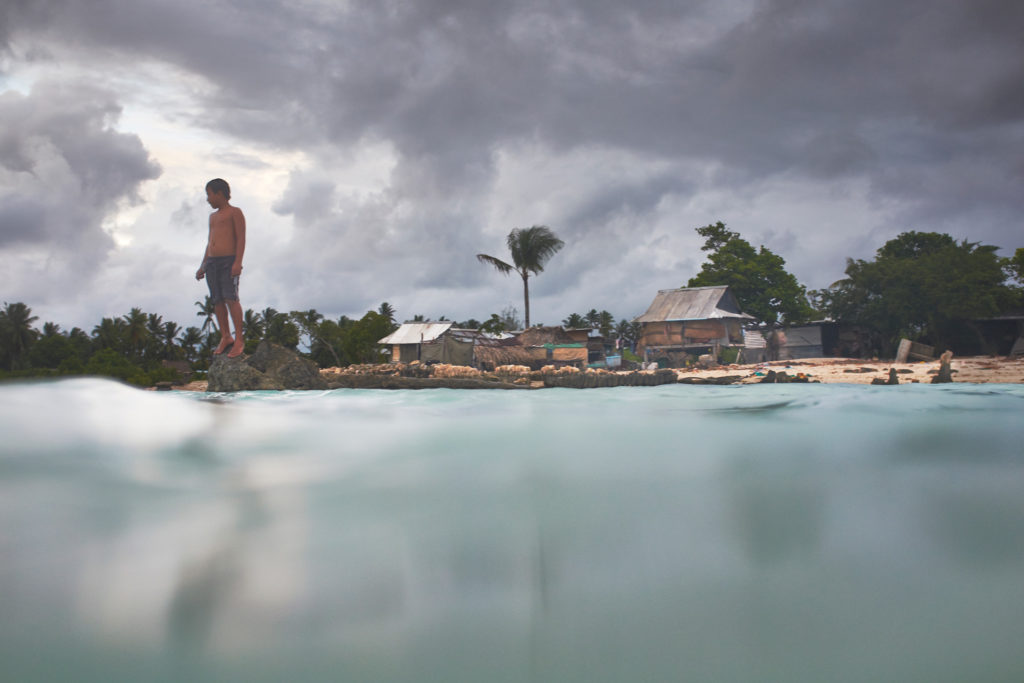“This is an act of war,” proclaims the main individual featured in the wondrous documentary Anote’s Ark, which takes place primarily in the remote Pacific island nation of Kiribati.
This is an era of urgency and if you are going to catch a climate change film, be sure to watch this deeply moving, people-centred one.
The documentary is screening May 2 and 4 at Toronto’s Hot Docs festival as well as other festivals in the next few months.
Kiribati (population: 100,000) sits in what is called “the centre of the world” — on the equator and smack dab on the international east-west dateline.
“We thought we were so isolated we could be immune from the tribulations of the world,” intones the wise Anote Tong, who served as the country’s leader from 2003 to 2016.
The documentary follows Tong over the last years of his term as he struggles to save his country and culture from the ravages of extreme storms and sea-level rise.
It is a finely tuned film dressed in deep melancholy and shot with so much care and cinematic artistry and prowess, you’ll feel deeply as your eyes are submerged in the images.
The documentary is shot and directed by Matthieu Rytz, who is originally from Switzerland but lives in Montreal, and backed by the city’s award-winning Eye Steel Productions. Anote’s Ark weaves Tong’s international fight with that of Sermary, a young mother of six, who migrates her family to New Zealand. At stake is the survival of 4,000 years of Kiribati culture.
Tong bounces between major international meetings with people such as the Pope, shows up on various TV talk shows (BBC, Al Jazeera, a perky Australian morning program etc.) and near the end, the Paris climate talks in 2015. And yes, he visits the Arctic Circle.
The film lovingly frames daily rituals, chats and religious ceremonies in Kiribati. Rytz allows the pictures and people to speak for themselves. There is no voice-over, thankfully.
“What is to become of my grandchildren when all of this comes in?” Tong asks at one point in the film. “It is going to destroy our lives.”
Kiribati is drowning. It is now experiencing typhoons that have, historically, never affected the country. Video shot by locals chronicle knee-high flooding.
Tong is on an emergency mission — he sees nothing is being done about fossil fuels and figures the only way to save his culture is to migrate the entire country to new land.
Polar bears, why?
Somewhere in the midst of the film he wonders why the world just wants to talk polar bears: “What is important?” “People, people, people,” he proclaims at yet another international meeting.
“No one has said, ‘oh when your islands are flooded, we will take you.'” There is nowhere to go when the islands are swallowed up.
Meanwhile, the other thread follows Sermary to New Zealand. She is one of 75 Kiribatis handed citizenship as part of an agreement to help out the island nation. Her arrival from the incredible sunny, languid and gorgeous climes of her country to the cooler, concrete jungles of Auckland are a stark reminder of the disconnect people have in other countries with the horrors of climate change.
No matter how aware you are, you are not a so-called “climate refugee” witnessing the destruction of everything you hold dear.
After two years adjusting to life in N.Z., she tells her husband: “I miss my home.”
Tong himself gets exasperated by the lack of leadership on climate change and a world devoid of answers.
“I’ve had a deep sense of futility,” he admits, adding he’s been depressed as well.
During the film, Tong does come up with an answer. It’s just one piece of a scary puzzle though.
“We do not have enough time to evolve into fish,” he notes.
As a BBC host keeps pressing Tong with one question about the Paris Agreement — why even fight to stop a 1.5 degree rise in temperature?
“What is going to happen to us is going to happen to the rest of the world,” Tong responds calmly and crisply.
According to current predictions, Kiribati will be wiped off the earth within this century. Tong struggles to find solutions so his people and society survive what is no doubt coming.
He — and his people — are like a solitary woodsman in a plastic culture.
Tong never loses his mission, he maintains a calm that speaks of an intense purpose immersed with integrity, cloaked in heartache.
As he states: “You may lose your home, but no one can take your dignity.”
For information on the film’s Hot Docs screening, click here.
Check out other screenings of the documentary on the film’s website.
Watch a short op-doc made for The New York Times.
June Chua is a Berlin-based journalist who regularly writes about the arts for rabble.ca.
Film still courtesy of Anote’s Ark




